| "The whispering editor..." |
| Major Barbara director, Gabriel Pascal on David Lean |
This Happy Breed is a love letter to English decency and stoicism set after WWI and just on the cusp of WWII covering twenty years of a typical English family's life. I have reservations of the word 'typical' but we'll come to those later. Originally a Noël Coward play (with Coward in the lead as the head of the household), it was offered to David Lean after his successful co-direction with Coward on In Which We Serve, another Coward production, Lean's first Noël as it were. Lean was nervous. It was a stage play after all but to untie any moorings to the stage production, Lean chose to shoot the film in three strip Technicolor, the visual equivalent of 'IMAX' today. And it is a sumptuous banquet of hues rivaling even Michael Powell's many colourful excesses (and Lean claims to have muted everything down). His direction is assured if a little repetitive (start most new scenes on a close up and track back to reveal a longer shot) but the film is a marvel of simple character, location and intent. Noël Coward was a man born into in a lower-middle class family who became the artistic personification of gentrification. He stepped over a few class boundaries with some flair and with This Happy Breed, tried to recollect the world from which he enthusiastically escaped.
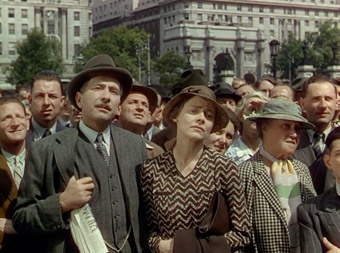
So with an enormous camera requiring extensive lighting rigs, Lean went about shooting This Happy Breed with hardly any consideration that a war was raging. To the director, the frequent air raid sirens were just inconveniences in sound recording at the time. To look at the film now, it seems inconceivable that it took ten months to make but the effort was worth it. It was the biggest grossing picture in the UK in 1944, a significant year in history and perhaps the cinema was really where people could forget their war-time worries. Familiar faces made up the cast of the Gibbon family and whether Coward agreed with the casting choices or not, the actors gel as an ensemble and the whole affair is rather touching. It was reported that Coward was a little miffed that Lean didn't consider him for the patriarch after the success of the stage play.
Lean emphasizes the ordinariness of British life, never skimping on showing the most mundane household chores. At the head of the family is the definitive pirate, Robert Newton. Six years after Breed, he would make his name as Long John Silver in Disney's Treasure Island and without realizing put an imprimatur on every pirate character on screen since – including Captain Jack Sparrow. It was a sort of loose, louche, Devonshire drawl, ah, Jim lad. A renowned drinker but loved by Lean as a performer, Newton was to be fined if he ever turned up on set half cut. At the polar opposite of sobriety was the wonderful Celia Johnson – and this is where the class element came in. She believed (in my opinion rightly but she did so well she changed my mind) that she was too middle class for the lower-middle Gibbons family. Coward persuaded her and this reed-like beauty went ahead and impressed everyone with her portrayal of wife and mother Ethel Gibbons. The tragedies and joys play out quite leisurely with the relationship between war buddies Newton and 40s favourite Stanley Holloway as the neighbour Bob Mitchell as a stand out. I'd forgotten how much pleasure there was (in all this special effect worship of today) in a solid script directed with some panache performed by both competent and superb actors.
There's a wonderful story about Celia Johnson's professionalism and talent that I must share. In the 40s, it was natural to work on the Saturday. As more of a mother and wife than actress, Johnson was insistent that she got away by noon to get home to family life. Lean was as insistent, five minutes before noon that they rehearse the scene of the daughter's homecoming (see the movie, major emotional stuff). Johnson plays the scene so well, that in three minutes and thirty seconds, she has the entire crew reduced to tears except one – herself. To Lean, she switches off like great actors can and steely eyed said "Well now, can I go please?" I would have given her the world just for that.
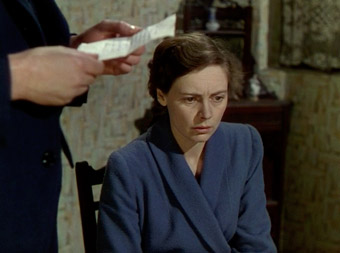
Before coming to prominence as director of some of the best and boldest British films for years (Great Expectations, Oliver Twist, Brief Encounter, not to mention his subsequent epics), David Lean, like your humble narrator, trained as a film editor. It's an oft misunderstood role with Hitchcock playfully suggesting that all an editor does is snip off the flash frames at the top and tail of each shot and join them together as per the script and director's instructions. If that were the case, we editors would have far fewer ulcers and far more respect for our directorial partners. In truth, even the best directors cannot foresee how a film will play once cut together and even then their proximity to it may skew their judgement. If you want to appreciate the role of an editor on a production, rent or buy Kinsey, and watch the first 10 minutes with the director, Bill Condon's commentary on – the opening of the movie, lyrical, enticing, exciting, forbidden and bold... an opening that had nothing to do with the director. It was all built from scratch by the editor, Virginia Katz, and all power to her.
Editors have minds cluttered with blueprints, ways in which movies can be cut and the plethora of meaning each cut will convey. In some respects their creative role is, if not equal to the writer or director, certainly not far below those exulted heights. We're at the coal face and dirty and sweating we blink into the light hoping the work works. Lean became an editor probably for the same reasons I did. The cutting room was a movie's command centre, its brain, a place where all the strands of a movie came together. Yes, it's preferable to sweeping the floor but Lean will be the first to admit that editing taught him directing. How do I know? Because he told me. Allow me a small indulgence.
Personal Aside:
I was assisting on the edit of a short film about Leonard Cheshire Homes in India over twenty years ago. Wiki the man. Respect is not even close to what he deserves in this life and the next. When in the cutting room, he was frail and had one lung missing but still played tennis at the age of sixty-eight. This extraordinary man, a recipient of the Victoria Cross, had an epiphany whilst observing the dropping of the atomic bomb on Japan. Let's just say that this level of destruction pushed Cheshire into devoting his life to the world's more unfortunate souls. With his then wife, Sue Ryder, the Ryder Cheshire foundation was born and care homes sprung up all over the UK. Our edit took a while because Chesire was not a film-maker but suggested he bring in a friend to help. The editor and I were professionals (!) and didn't need any help per se just some direction. With that attitude, we got into the cutting room the next day to be greeted by (drum roll) Mr. David Lean or Sir as he was knighted in 1984. Star struck doesn't cover it. He spoke fondly about scenes from his next movie, Nostromo and one scene in particular stuck in my mind and how wonderful it would have been given Lean's talent. He also told me explicitly "Never forget the wide shots..." Alas, he died in April 1991 and his friend Leonard Cheshire passed on the following year (and his spirit dominated the Queen's speech in 1992)...
Have a read: http://www.sim64.co.uk/queens-speech-1992.html.
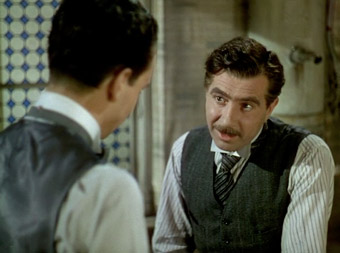
Something else contributed to Lean's ambition and the man himself tacitly acknowledges this. He had elevated directing to a job done by supermen (were there women directors in the 40s?) On the sets of the first movies he cut, he soon came to accept that a director was just like any other Joe, someone whose opinions were heeded and someone who was lucky enough to impress someone high up at some time in their lives. So Lean, the self proclaimed "frightened rabbit" acted as a sort of editorial advisor on Major Barbara, whispering in the director's ear as to what shots were still needed to make sense of the narrative. Lean, as biographer Kevin Brownlow wrote in his excellent and comprehensive book 'David Lean':
"...was able to witness the behaviour of a producer-director who was almost entirely incompetent, committing waste on a monumental scale in the middle of a war. The experience left a deep and abiding impression."
With respect to the directors I have worked with, I was even more determined in my career aspirations because being there meant demythologizing them. In short, directing is having some knowledge of everyone's job, a comprehensive knowledge of lenses (how else will you know what you want?), a feel for scriptwriting and an opinion that's accepted as being the final one. I could do that. So can you...
The first thing that has to be said about this version of This Happy Breed is that the picture – "Ah, Technicolor..." – looks absolutely gorgeous. I "ooh'ed and "ah'ed" all the way through. It really is arresting at first because everything is so lush, so vibrant. The restorers have done Lean and everyone else associated with the picture proud. Even though it's presented in the original 1.33:1 aspect ratio, it honestly feels like it might have been shot yesterday.
The mono track is faithfully Dolby encoded and there's no problem with comprehension. There are neither subtitles nor a descriptive audio track.
DISC 1
1. Original Theatrical Trailer (2' 27")
Proving that nothing entices like a past success, This Happy Breed comes to you from the makers of In Which We Serve. Of course! Alternate takes are used (not an abnormal practice) and the whole trailer revels in its presentation of ordinariness. Then it hit me. This Happy Breed is to the 40s audience what The Royale Family is to the 00s... a mirror and a comforting one at that.
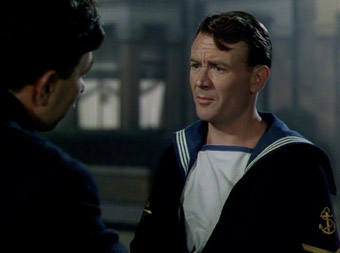
2. Re-Release Trailer (2' 12")
This is very similar (but grubbier) than the above with a few shots snipped out and more detail in the superimposed titles. Remember, before the internet, the cinema was the only place to see these images so re-releases of popular films were common.
3. Comparison Restoration and Original (7' 00")
This is a real eye opener not because of the wonderful clarity and colour of the restoration but the state of the comparison print. It's like someone's over exposed the 'bad' print. It's not stable in the gate and it's dirty... Nothing like showing off the good when the bad is as bad as this. But still, it's a terrific restoration job and this shows you why.
DISC 2
Please Note: at the start of each South Bank Show there is a proviso that states "Some edits have been made to this programme for contractual reasons." We've seen this before – beloved movies having to change their movie scores because the rights have expired. If you want the uncut show then you'll have to find someone who recorded it when it was first transmitted. This is where I do my evil laugh as I am such a person...
1. South Bank Show Special: David Lean A Life In Film (2 hrs 11' 49")
This one's a monster and if you are a fan of one of the great directors, you are going to relish the idea of holding a close up on him during a take to see what he concentrates on. Melvyn Bragg (host of UK arts show The South Bank Show since 1978) secures unrestricted access to Lean for a short period while he shoots his last feature A Passage To India. Personally, I think India is a lot of sturm and drang over almost nothing and kept that opinion against my friend Richard Franklin's tidal wave of arguments to the contrary. India pales against almost all of Lean's other work... by miles!
That said, this is a fascinating glimpse into the very singular world of David Lean. The scarves of the women in the open top car do not trail back and shimmer in the wind as they did in Lean's imagination – the efforts made by the British crew to accede to his wishes... Film-making is such a curious occupation, the only one in which a dreamer dreams and an army gives the dreams flesh. One can imagine a similar look behind the scenes of a Kubrick film (Vivian Kubrick's excellent behind the scenes film on The Shining notwithstanding). Stanley's perfection may have outstripped Lean's. And there are some directors out there (no names but this is true) who resent the fact that Kubrick gets to have exactly the right light bulbs in a wide shot of a period hotel. No one, not even with Blu-Ray, is ever going to know. But then Stanley and David both would answer the same: "I would." And this is, in part, what makes them great directors.
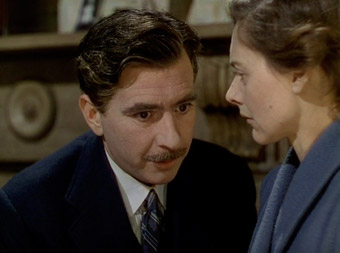
2. South Bank Show: David Lean and Robert Bolt (41' 24")
This is as good a place as any for all those South Bank Shows that will never make it on to DVD in any other way. This one, though not a buttock testing special like the first, has its own distinctive identity. The superb writer, Robert Bolt had recently had a stroke from which he fought his way back but it left him with severe articulation difficulties. All praise to Bragg who seems to understand him very well, laughing at his reminiscences. I'd need a few passes to extract the sentences delivered patiently but for a man of Bolt's intellect and wit to have this disability is like the potential delivery of a precious stone. The stone still has great value but the postal service is on strike. There are some subtitled sections but not at the start. But then again, paying closer attention to a great man is not an effort.
Lean talks about how rewarding his relationship with Bolt is and then the editor of the show does something sly (which from an editorial perspective is a gift...). He/she cuts in a shot of Bolt talking to Lean saying "You are the only friend I have..." and before the brine has a chance to queue up in your eyeball, you realize he's reading from his script... Sucker punch! Lean and Bolt's two way conversation has to have been covered by two 16mm cameras otherwise that dynamic is an even bigger lie than single camera coverage usually is. There is also wholesale stealing from the earlier show showing Lean directing A Passage To India (I guess inevitable) but on the whole this is fascinating stuff. It's so rare to observe any of the greats actually working (and working on the script is the very essence of film making). This documentary is also quite touching – long held shots of the participants, as close as we'll get to shooting the thought process. Both documentaries are solid accompaniments to the main feature.
Image Gallery (5' 30")
105 behind the scenes stills of the cast and crew. But as a lot of these faces are unknown, what their role was is unclear without captions. But here's a tip for recognizing a young David Lean. He had the biggest ear lobes I've ever seen on anyone.
Digital Extras (on disc 2)
1. Exploitation Booklet – 5 pages of story, cast and crew info and some poster ideas. It's almost quaint but this was the 40s.
2. Original Pressbook – 5 pages of the synopsis and the cutest little sketch of the house in which all the events take place.
3. Original Flyer – with 2 pages of cast list and synopsis.
4. This Happy Breed script – wow! It's an original (can't make out whose signature is on the front page) and nearer the end the type starts to fade which s a real shame as this is a true collector's item (well, the actual paper script would be but for enthusiasts who care little about the monetary value of the item itself, this digital pdf is like gold). A David Lean/Noël Coward original.
Extras Not Able To Review:
According to the press release there will also be:
1. A Commemorative Booklet by noted British Film Historian, David Rolinson.
As a movie, This Happy Breed is a terrific character study with inventive direction given the confines of the environment. As a technical clean up, this disc is a tour de force. Aside from the multiple and relevant extras, the disc would be worth picking up for the quality of the restoration alone. Highly recommended.
|